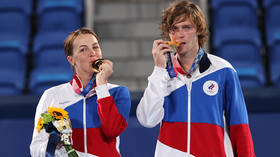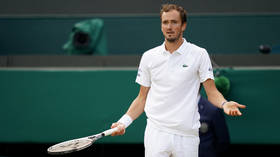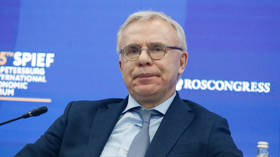Premature to talk about Russian 2024 Olympic ban – tennis boss

Any speculation about Russian athletes being banned from the 2024 Paris Olympics is much too premature, according to Russian Tennis Federation president Shamil Tarpischev.
International Olympic Committee (IOC) honorary member Craig Reedie said in an interview published earlier this week that Russian and Belarusian athletes could effectively find themselves barred from appearing at the Paris Games in two years’ time.
That is partly because they might not be cleared for qualifying events ahead of the competition due to the sweeping bans in place across various sports following an IOC recommendation at the end of February.
Discussing the prospect of Russian tennis stars missing out in Paris, Tarpischev said it was too early to predict how things would pan out.
“The rules for qualifying for the Olympics haven’t changed,” said the tennis official.
“The best players in terms of rating points qualify after the French Open [of the same year as the Games].
“To be guaranteed to get there, you need to be in the top 80, but no more than four representatives from the country qualify.”
Russian tennis players are free to compete as neutrals by the ITF, ATP and WTA, although they have been banned from team events such as the men’s Davis Cup and the women’s Billie Jean King Cup.
“For now we are suspended, and it is premature to discuss [Russian players missing the Olympics],” added Tarpischev, who himself has been an IOC member since 1994.
“We have to wait and see how the situation in the world develops. In any case, it will be the decision of the International Olympic Committee.”
At the 2020 Summer Olympics in Tokyo last year, the Russian team appeared under the banner of the Russian Olympic Committee (ROC) due to World Anti-Doping Agency (WADA) sanctions and left with three medals in total, including mixed doubles gold for Anastasia Pavlyuchenkova and Andrey Rublev.
Tarpischev’s comments about Paris 2024 echo those made elsewhere by Russian sporting officials in the wake of Reedie’s warning this week.
Speaking on Wednesday, two-time Olympic ice hockey champion Viacheslav Fetisov criticized the former WADA chief, comparing the situation to “monkey football” because of the scattergun bans applied to Russian athletes.
“I know Reedie well. He says that Russian and Belarusian athletes might not take part in the Olympics because they will not be able to compete in the qualifying competitions,” Fetisov was quoted as saying by RIA Novosti.
“You yourself recommend that international federations not allow [Russian] athletes, and then you say that they haven’t passed through qualifying.
“They [the IOC] have refugee teams that have not passed any qualifying, nothing... A lot of things aren’t clear,” added Fetisov, who is now a State Duma Deputy in his homeland.
“The worst thing in sports is when the rules of the game change during any competition. There is the expression ‘monkey football’,” said the 64-year-old.
“You can imagine, if you give the monkeys a ball, they’ll kick it, no one knows where to run, or why.”
Led by president Thomas Bach, the IOC recommended on February 28 that federations across all sports refuse to invite Russian and Belarusian athletes to international competitions due to the conflict in Ukraine.
That stance has since been adopted by a wide variety of federations, but has been decried by Russian officials as discriminatory and contrary to the principles of sport being outside politics.














